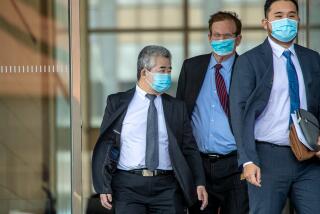Focus of Ryan Defense Is What Witnesses Didn’t Say
- Share via
CHICAGO — George H. Ryan’s lead defense attorney shot back at prosecutors on Tuesday, saying the former Illinois governor had suffered “seven years of hell” as federal investigators built a corruption case against him.
Yet after hundreds of interviews, more than five months of testimony from scores of witnesses and a mountain of paperwork, prosecutors failed to produce a single person who could testify that they had seen or given Ryan a bribe, attorney Dan K. Webb told the federal jury during his closing arguments.
“The entire federal machinery here in Chicago investigated George Ryan, and they didn’t get anybody on the stand to say that,” Webb said. “Maybe George Ryan made mistakes. Maybe he did things you think he shouldn’t do. But that’s not enough.”
Prosecutors have charged that Ryan, 72, and his relatives accepted tens of thousands of dollars in bribes in exchange for state business contracts from 1991 to early 2003.
Among other things, Ryan allegedly lounged in Jamaica and Cancun at someone else’s expense; encouraged state workers to aid his and other political campaigns while on the state payroll; and enjoyed complimentary trips to Las Vegas casinos with co-defendant Lawrence E. Warner. Ryan also allegedly received glass figurines for his anniversary, a band to perform free at his daughter’s wedding and more than $140,000 in loans for his brother’s business.
As prosecutors wrapped up their closing arguments Monday, they reminded jurors that, by Illinois law, it doesn’t matter if there is not a specific instance of a cash-for-contracts quid pro quo.
Instead, they said, Ryan can still be guilty of fraud if he exhibited a pattern of behavior that shows the former governor and secretary of state accepted personal or financial benefits to perform official acts.
“Just because he didn’t sell his office for high-priced items doesn’t mean he didn’t sell his office,” said Assistant U.S. Atty. Laurie Barsella.
Closing arguments are expected to conclude this week, with jurors receiving their instructions on Friday.
Prosecutors have also charged that Warner, 67, a businessman and longtime Ryan family friend, profited the most from Ryan’s alleged wrongdoings. Together, Ryan and Warner face 22 counts, including racketeering conspiracy, mail fraud, filing false tax returns and making false statements to investigators.
They have pleaded not guilty.
Legal experts contend that the prosecution’s biggest hurdle has been relying on numerous witnesses to create a piecemeal pattern of corruption.
Webb, a former U.S. attorney in Chicago, kept returning to the prosecution’s lack of a decisive witness.
With the words “Beyond A Reasonable Doubt” repeatedly projected on a large screen otherwise used to show key bits of evidence, Webb waved his hand toward the prosecution team and told jurors, “The people at this table think this case is in trouble.”
Assistant U.S. Atty. Patrick M. Collins snapped out an objection. “I don’t think this case is in trouble.”
Webb quickly replied, “Let me put it this way: I believe this case is in trouble.”
Webb highlighted a discrepancy in the testimony of Nicole Altounian, who worked for Ryan’s political fund. Granted immunity by prosecutors, Altounian agreed to testify at Ryan’s trial and the 2003 trial of Scott Fawell.
Fawell, Ryan’s former campaign manager and chief of staff at the secretary of state’s office, was convicted of racketeering and fraud after Altounian testified that he was the “ultimate decision-maker” for Citizens for Ryan. But at Ryan’s trial, she testified that Ryan made all the decisions.
More to Read
Sign up for Essential California
The most important California stories and recommendations in your inbox every morning.
You may occasionally receive promotional content from the Los Angeles Times.













